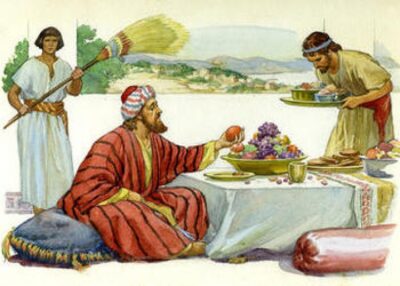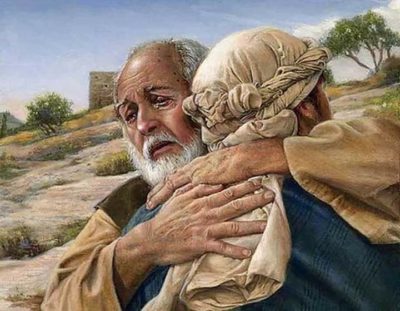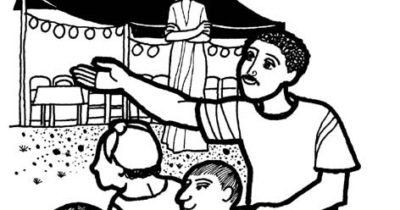September 4, 2022
|by N W
|
5 Comments
|
Deacon Mark, Humility, Saints, Trust
|
Detachment
Twenty-third Sunday in Ordinary Time
September 4, 2022 — Year C
Readings: Wis 9: 13-18b / Ps 90 / Phmn 9-10, 12-17 / Lk 14: 25-33
by Rev. Mr. Mark De La Hunt, Permanent Deacon
Last Sunday, Jesus spoke about the virtue of humility, as He told the Pharisee and his guests that those who humble themselves will be exalted. In today’s gospel, He is teaching us about the virtue of detachment, even from family members.
Detachment’s power is like humility in that it frees us to be happy and to love. Along with humility, it is necessary for us to respond to Jesus’ call to discipleship. Jesus told us that to be saved, we must “strive to enter through the narrow gate (Lk 13:24).” One way we strive is by detachment from our way and our stuff, which frees us to love God first and then others as our self. This is the path that leads through the narrow gate.
Bishop Barron said that one of the most challenging things Jesus ever said was, “Whoever comes to me and does not hate father and mother, wife and children, brothers and sisters, yes, even life itself, cannot be my disciple.” Father Pablo Gadenz explains this unsettling passage well. “Jesus’ reference to hating one’s relatives is a Jewish saying that uses exaggeration to indicate one’s preference. For example, in the book of Genesis, the phrase, “Leah was hated” means Jacob “loved Rachel more than Leah” (Gn 29: 30-31; Gadenz 269).” Thus, Jesus was making the point that we must love Him before everyone else, even family.
Detachment is important in our everyday life, especially family life. For example, people say the leading cause of failed marriages is money. Not so. That is a symptom, not a cause. The leading cause is the husband and wife loving the various things in this world first and then Jesus, or even loving each other first before Him. Jesus is the fount of love, not our spouse. Jesus is the source of our happiness and peace, not the accolades and stuff. We hear Jesus express it this way, “For where your treasure is, there will your heart be (Lk 12:34).”
Where is our heart during Mass? Where is the treasure? During the Eucharistic prayer, Father says, “Lift up your hearts.” We enthusiastically respond, “We lift them up to the Lord.” Fr. Jeremy Driscoll says the command to “lift up our hearts” is a signal to leave all thoughts of this world behind…all our joys, all our sorrows, and all our responsibilities. Our words, “We lift them up to the Lord,” are a pledge of detachment from this world. It enables us to fully participate in the Eucharistic prayer and recognize the Eucharist as our treasure, that our hearts may be there.
When detachment applies to our ego it takes the form of humility. Jesus gave us this example, “But if anyone slaps you on the right cheek, turn to him the other also (Mt 5:39).” And St. Paul gives us more guidance in Romans 12, “Bless those who persecute you, bless and do not curse them…Repay no one evil for evil, but take thought for what is noble in sight of all (Rom 12; 14, 17).” Detachment from our ego involves detachment from getting even with those who hurt or shame us. The ability to not escalate conflict is rooted in trust that God will render judgment and justice; we don’t need to.
When it comes to detachment the saints are our teachers. Here are four: St. Ignatius of Loyola, St. Francis of Assisi, St. Theresa of Avila, and one I’ll make you guess.
Our first saint, Ignatius of Loyola, in his still very popular Spiritual Exercises, developed a “Principle and Foundation” that helps us understand the spirit of Christian detachment. He starts with the most fundamental of questions, “Why were we created?” We were created to “praise, reverence, and serve God our Lord, and by means of doing this to save our soul (O’Brien 67).” To attain this, we must make ourselves indifferent to all created things. How do we do that?!
St. Ignatius wrote that, “In everyday life we must hold ourselves in balance before all created gifts insofar as we have a choice and are not bound by some responsibility [like earning money to pay the bills]. Consequently, on our own part we ought not to seek health rather than sickness, wealth rather than poverty, honor rather than dishonor, a long life rather than a short one, and so on to all other matters. Rather, we ought to desire and choose only that which is more conducive to the end for which we are created.” Said another way, and I love this wisdom, “our only desire…should be this: I want, and I choose what better leads to God’s deepening life in me (O’Brien 67-68)”.
That is the Christian world view in a nutshell. The greatest good of everything we see and experience in this world is how it helps us to strive to draw closer to Jesus, who is the narrow gate.
The next three saints’ lives give us examples of Ignatius’s wisdom in practice.
Maybe no mere human demonstrated this world view better than St. Francis of Assisi. His detachment from possessions and ego are legendary. Bishop Barron said that St. Francis was the most powerful man in his day, for no one could cause him distress. If someone took his shirt, he would give them his pants too. If they insulted him, he would agree with them, and one up them, insulting himself even more. His detachment from his ego and his material possessions freed him to love Jesus and neighbor. Was he a lesser man from such radical detachment? No. We still admire him, study his life, put his statue in our gardens, and seek his prayers eight hundred years after his death.
Our third saint, Teresa of Avila, in her book, Way of Perfection, touches upon the three pillars of last week’s and today’s homilies. She emphasized, “three essential virtues that are the foundation of the Prayer of the Heart; humility, love of one another, and detachment.” She said that love of neighbor is enabled by our detachment from all material goods and makes us free for the service of the Kingdom. She was echoing Jesus in today’s gospel when He said, “whoever of you does not renounce all that he has cannot be my disciple (Jn 14:33).”
Our mystery saint’s life shows us the wisdom of “seeking first the kingdom of God and all His righteousness,” for then all the things we want were given to this saint (Mt 6:33). Despite being an athlete, an actor, an outdoorsman, and accomplished scholar, he exemplified humility and detachment. He lived Ignatius’s Foundation and Principle. He chose a short life but was given a long one. He chose poverty but was given wealth. He chose a low place of service but met with world leaders and hundreds of thousands flocked to hear and see him. He chose peace but destroyed the powerful who chose violence. Who was this?
It was St. Pope John Paul II. He chose to become a priest when the penalty for doing so was death. He slept on the floor and wore a tattered cassock and gave away fancy gifts parishioners gave him. The only nice things he kept were his outdoors equipment that he could use to take the youth on hiking and skiing trips, where he taught them the Gospel to counteract the immoral teachings in the atheist communist schools. He did not seek advancement, but he was made bishop and eventually Pope. As pope, when greeting a large crowd, he often walked past the rich, famous, and powerful to hug and to bless the poor, especially moms. He did not promote violence to overthrow the communists who oppressed his beloved Poland, but he strengthened the people’s faith in God through the Catholic Church. Unified in their Catholic faith, his people gained their freedom. Detachment was so powerful and so transformative for John Paul because through it he let go and let God.
Here are some closing thoughts. A sign that detachment is working in our lives is a sense of peace about who we are and about the choices we make. I had a tiny success in practicing detachment in my own life and pray I have many more. I was disconcerted about my hair loss, my greying beard, and my declining strength and health. But then I practiced some spiritual judo and started thanking God for those things. The grace from thanking God for these signs of aging transformed them from curses to try to escape to gifts that bring joy. Wrinkles, a greying beard, and declining strength are the wrapping paper around the gifts of getting to see my grandkids, of growing in friendship with our adult children, and now that they are grown, to relearning how to be my wife’s romantic best friend.
In other words, I am learning from looking back over my life, reading about the lives of the saints, and from the saintly example of many of you to trust that God loves me and actively takes care of me. This trust enables us to detach ourselves from grasping and striving for beauty, money, power, pleasure, and honor. Once detached, we can choose the one thing that matters, keeping Jesus first in our lives.
Lord Jesus, help us to let go of our way and our stuff, that we may love You first and then others as ourself. Amen.
Citations for Further Reading
- Catholic Commentary on the Gospel of Luke by Father Pablo T. Gadenz. Wonderful, easy to read modern commentary. It gives you Reflections and Life Application, historical context, quotes from saints, and ties passages from Luke to other parts of the Bible.
- Word on Fire Bible-The Gospels by Bishop Robert Barron. This has beautiful art, quotes from saints, and reflections by Bishop Barron.
- The Ignatian Adventure by Fr. Kevin O’Brien, SJ. This book is set up to lead you through your own, private Ignatian retreat. This is a powerful book to jump start new spiritual growth and a greater closeness to Jesus.
- What Happens at Mass, Abbot Jeremy Driscoll, OSB. This book reawakens the reader to the power and mystery of the Mass, but in an easy to understand way. It has been quoted by Bishop Barron and Ascension Press’s Dr. Ed Sri.
KEEP READING
 540-586-8988
540-586-8988 










